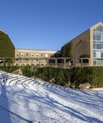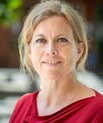Welcome to the new semester
A new group of freshmen are on their way. Dean Johnny Laursen looks back at the summer and gazes into his crystal ball. What lies in store for the faculty’s staff and students in the autumn semester?

Dear staff and students
Despite the rain that fell on Denmark this summer, I hope that you have all had a good holiday with time to spend with family and friends. I imagine that many of you headed south to the Mediterranean or other exotic destinations in search of the sun. But most of you are probably home again now – in both body and spirit.
The faculty is facing a pretty tough task: we have to compete with your memories of hot sand between your toes, cool drinks and BBQs. Some people might think that this is mission impossible. But I know enough about our staff and students to know that our high level of commitment to our jobs will triumph over the memories of hammocks in the garden, high days and holidays.
So the real question is how our faculty, schools and other units can best support the academic work that is done here at Arts. This task has been made easier thanks to all the hard work that has been done since the summer of 2014 in particular. The future structure of our faculty and schools has now been finalised.
But I’m guessing that like me, many of you have spent some of your spare time during the summer months thinking about what the faculty will look like once the dust has settled on the changes that have been made.
Strategic considerations
In particular, I’ve been wondering whether my appointment as new dean means that the faculty should have a new strategy. We worked hard on producing the faculty strategy in 2013, and our schools worked hard on their strategies too. I’ve just read the consultation responses and proposals for the strategy, and the experience made me feel optimistic. So my reply is that the goals stated in our strategy are fine – even though some aspects are less relevant now than they were two years ago, and some challenges have cropped up in the intervening period as well.
What I do believe is that the faculty management as well as our schools and centres and faculty liaison committees should devote more time to debating the strategic challenges and opportunities that lie ahead.
The Academic Council has put two themes on the agenda for the near future: Equal opportunities, and the faculty’s identity. These are important and interesting themes, reflecting an increased focus on the humanities generated by the Humanomics project and its publication of a book underlining the values of the humanities (“Kampen om disciplinerne”).
Ongoing focus on our degree programmes
There’s no doubt that the biggest tasks and opportunities for the faculty in the next few semesters concern our degree programmes. Not least, we need to ensure the academic and financial sustainability of the degree programmes which will be affected by the government’s resizing initiative. The work that started in the spring will continue with a view to reducing drop-out rates, amalgamating degree programmes, focusing on student recruitment and career opportunities, and collaborating with other universities at home and abroad. We will also try to simplify the way our degree programmes are organised – not only to take the strain off our administrative and academic staff, but also (hopefully) to make life easier for our students.
Even though the political decision-makers have launched a discussion of the study progress reform, we will probably still have to reduce our degree completion times in one way or another. In other words: the task probably won’t get any easier, but we can at least hope that we’re given more freedom to decide how we want to perform it. And that the politicians understand the academic and employment-related costs of the reform.
Last semester the university started discussing the quality of our degree programmes moving forward – inspired by the rector’s statement about the academic importance of the Master’s thesis. The baton has now been passed onto the Committee on Education and the boards of studies, while our degree programmes consider how to use the existing framework (which will hopefully be more flexible soon) to retain the Master’s thesis as their academic culmination.
And finally, the language subjects at both Arts and BSS will continue their discussions of opportunities for closer collaboration.
What do the politicians say?
The Danish voters elected a new government to power while we were all busy with exams at the end of the spring semester. For our faculty it has been particularly interesting to listen to what our new minister has been saying about the importance of an all-round education and the significance of the humanities.
I’m sure that his remarks about the humanities can also be applied to theology (his own area of expertise) and education science. And I’m delighted that he has so clearly underlined the importance of research and education at our faculty and the corresponding faculties of other Danish universities. We look forward to hearing more about his ideas.
The new normal
In June I said that the development process at the Faculty of Arts was over, and introduced a period less dominated by such processes. But it’s important that we don’t get becalmed. The decision-makers will continue to focus on the humanities. And there are also a few outstanding tasks to be completed. For instance, we need to continue our discussions of the faculty’s research.
As part of our development process we decided to evaluate the previous research programmes – this will be completed with an extended management seminar at the end of August. In addition to the evaluation, and based on input from our school research committees, we will decide whether there are any cross-disciplinary themes which are particularly suitable for research collaboration. As agreed, our schools will then finalise the decentralised discussions of their research structure and profile.
We also agreed to start talking to CUDiM about university pedagogics, digital media in teaching, and upper-secondary education. In other words, there are still some important questions to be resolved. I think it’s important to allow time for these discussions, and to keep the focus on our main tasks: research, education, public-sector consultancy and communication. Let’s all try to ensure that this situation becomes the new normal.
There’s plenty of work ahead. But the very first task is to launch the autumn semester and meet and greet the new students – so there’s plenty to look forward to, as well.
I hope you all enjoy the start of the new semester.
With best wishes
Johnny Laursen

